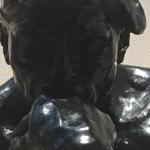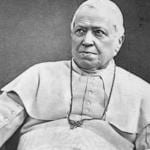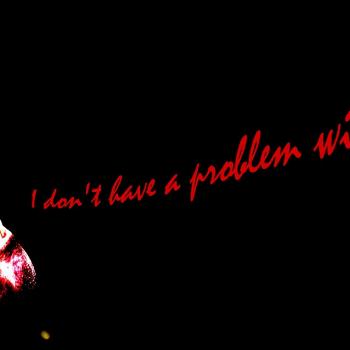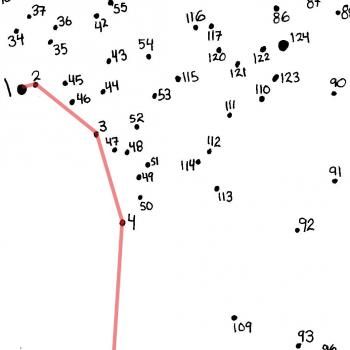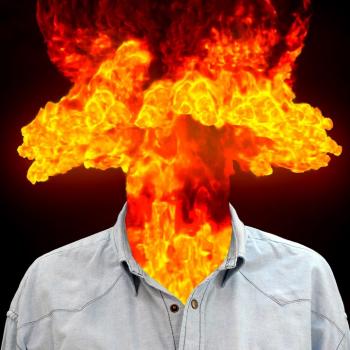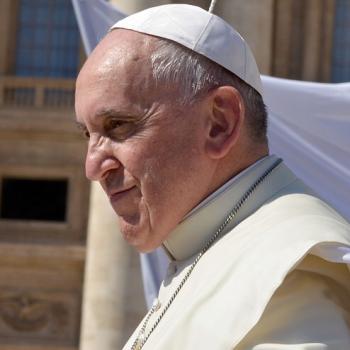
Once upon a time Patrick Coffin was a decent Catholic apologist with Catholic Answers Live. But since those days he has gone freelance and embraced the alt right and now uses expressions like “red-pilled” and gives credence to stains like Milo Yiannopoulos and E. Michael Jones. (Mr. Coffin has blocked me on Twitter, by the way. We had never interacted once. That’s neither here nor there; I mention it by way of parenthesis.) This time, he’s not trying to give Milo or Jones credence; he’s hosting Cardinal Burke to try to lend himself credence. Specifically, he asks Burke what he has to say about theories that the conclave was invalid. Pope Francis may not really be the pope, you see. Perhaps Benedict is still pope; perhaps there’s been a sede vacante since 2013; perhaps the conclave really elected Burke, or the resurrected Siri. Who knows what we’re supposed to make of this.
Dr. Dawn Eden Goldstein has transcripts. (For which I am immeasurably grateful to her; since I am still trying to recover from listening to Coffin’s full interview with Milo and Taylor Marshall’s full podcast on the credibility of demons, I had no desire to lose untold minutes of my day in another fetid swamp.)
Mr. Coffin, because accusation is confession, begins by describing Francis’s papacy as a “wincefest.” He recites a long list of the pope’s supposed outrages. Under Francis, he says, we “got the ‘who am I to judge’ with respect to homosexuality.”
I stop here, right from the start. I shall have to stop often, for the errors are legion. The object of Pope Francis’s question “Who am I to judge?” was not “homosexuality.” I have pointed that out many a time and oft on this here wery blog. Rather, he said those words specifically about gay priests “who are of good will and seek the Lord.” Presumably these are priests who are obedient to their vows. The pope did not say “Who am I to judge?” about Elton John or Andrew Sullivan or Pete Buttigieg. Homosexual persons are called to chastity, the Catechism says; and if a priest is obedient to that call, who are you to judge indeed? For homosexuality is not sinful; homosexual acts are. Pope Francis was quite right.
But Burke did not bother to correct Mr. Coffin on this point.
Another supposed outrage, says Mr. Coffin, is “Laudato Si teaching that global warming and climate change is a thing, even though it’s not [sic].”
And I pause again. How does Mr. Coffin know that climate change is fiction? Is he a scientist? Does he have information that the question’s been settled? But let that go; the more important point here is that Laudato Si does not “teach” global warming and climate change. Get your encyclical out, dear reader, and turn with me to §188. There you will read these words:
There are certain environmental issues where it is not easy to achieve a broad consensus. Here I would state once more that the Church does not presume to settle scientific questions or to replace politics.
The Church does not presume; Pope Francis does not presume; but Mr. Coffin does presume. I suspect he was too busy at the moment swallowing red pills and missed that part of the encyclical. But I am sober, dear reader, and I caught it. Now, Pope Francis clearly believes in global warming. That’s not in doubt. But so does the pope emeritus, Benedict XVI. In 2008, for the World Day of Peace, he called climate change an “urgent issue.” (Find the text here.) And two years later, in 2010, Pope Benedict titled his address “If you want to promote peace, protect creation.” What a radical leftist he was! I mean, the whole thing was a wincefest. Maybe Mr. Coffin was otherwise engaged at the time and did not notice. Maybe his insurance did not cover the red pills before Obamacare. But read with me and see for yourself; here’s Benedict:
Can we remain indifferent before the problems associated with such realities as climate change, desertification, the deterioration and loss of productivity in vast agricultural areas, the pollution of rivers and aquifers, the loss of biodiversity, the increase of natural catastrophes and the deforestation of equatorial and tropical regions? (4)
Benedict calls climate change a “reality”; saints preserve us! I mean, there’s no consensus on this; Coffin locuta est. But because of the dangerous heretic Benedict XVI we now have Laudato Si, in which “Nature seemed to have been exalted as a person.”
Seemed? Mr. Coffin is not sure? But he’s red-pilled now; how can he not be sure? He’ll have to instruct us where he finds this exaltation in Laudato Si. Peradventure he has in mind expressions like “Our Sister Mother Earth” in §1. But the pope is quoting St. Francis of Assisi. Maybe Mr. Coffin will tell us that St. Francis was an ecofascist. He doesn’t say.
Neither does Burke bother to correct Coffin on any of these points.
PRAY HELP FROM ABOVE
—
All this has been set-up for the question Mr. Coffin wants to pose to Burke:
Some Catholics are wondering if it’s permissible to investigate whether or not the 1995 Apostolic Constitution Universi Dominici Gregis by St. John Paul II [Actually, UDG came out in 1996.], who laid down the norms for future papal conclaves, whether those rules were violated and whether or not the whole election of Pope Francis might be invalid. Is there any foundation to that speculation?
No. End stop.
But you see, those FaithfulCatholics™ who have been swallowing whole pharmacies of red pills over Pope Francis have a real problem. They want to reject his Magisterium, but deep down they know that’s not really consistent with their chest-thumping insistence on their own faithfulness. But if the conclave was illicit, if it broke the rules, if the pope’s not really the pope, then we have a license to throw all that out. We can get rid of Evangelii Gaudium, we can get rid of Laudato Si, we can get rid of Amoris Laetitia. And we can get rid of that pesky Bergoglio, call another conclave, and elect someone else. Possibly even Burke himself, if all goes according to our schemes the Holy Spirit’s direction.
And at this point, what Cardinal Burke—indeed any Prince of the Church—should have done was shut down the whole idea of any such speculation. Shame on you, Mr. Coffin. Unless your evidence has all its i’s dotted and all its t’s crossed we don’t speculate that the pope’s not the pope. That encourages dissent, that encourages faction, that encourages schism, we will have none of that, and you, Mr. Coffin, are not going to use me or my position in the Church to lend credence to these rebel yells of yours. Get thee to a confessional; why wouldst thou be a breeder of schismatics?
Of course, that’s not what Burke did do.
HE LIVES IN HIS OWN HEAVEN
—
But before we get to that, let’s back up for a moment, because Cardinal Burke has been banging war drums against Pope Francis for some time now. In 2016, he was one of four signers of the “dubia” about Amoris Laetitia; and the next year he was talking about the grave necessity of “correcting” the pope if answers were not forthcoming. (As though Canon 1404 said “the first see is judged by any cardinal who sees fit.”) He even granted an interview to Catholic World Report, and speculated that a heretical pope would cease to be pope:
CWR: Some people are saying that the pope could separate himself from communion with the Church. Can the pope legitimately be declared in schism or heresy?
Burke: If a Pope would formally profess heresy he would cease, by that act, to be the Pope. It’s automatic. And so, that could happen.
CWR: That could happen.
Burke: Yes.
I noted at the time why Burke was wrong. In the first place, the Church has dogmatically taught that a pope can not “formally profess” heresy. (To hold that such a thing is possible is itself a heresy, if we’re to believe Vatican I.)
But apart from that, the speculations of Bellarmine that a heretical pope would cease to be pope are not canon law; they’re theological speculation. And even if a pope were a heretic, without professing it formally, no one has the authority to depose him. To say that he would cease to be pope because he would—it would be an existential deposition—is no solution either.
But no, no, no, said Burke to Catholic World Report, I’m not saying Pope Francis is a heretic. For shame, for shame. I’m just playing a little parlor game here, apropos of nothing, for amusement, because Pope Francis took away my situation and I have nothing better to do than give interviews and ask “What if?” Pope Francis is responsible for the boredom that leads me to gad about and speak to the fake news.
But now here we are in 2019 and Cardinal Burke signs on to a “correction” of the pope accusing him of heresy! Well, what do you know? I thought Burke said he wasn’t doing that. The document that Burke signed borrows verbatim from the “Filial Correction” of 2017, which I wrote seven articles refuting: one / two / three / four / five / six / seven. In every case, the supposed heresy was either nowhere to be found in Amoris Laetitia, or the text expressly denied the heresy The Correctors said it promoted. It was an embarrasing piece of work, but Burke signs on to its language.
Dr. Goldstein on her Twitter thread calls attention to this passage from the recent “Declaration of Truths”:
Before the eyes of the Divine Judge and in his own conscience, each bishop, priest, and lay faithful has the moral duty to give witness unambiguously to those truths that in our days are obfuscated, undermined, and denied. Private and public acts of a declaration of these truths could initiate a movement of a confession of the truth, of its defense, and of reparation for the widespread sins against the Faith, for the sins of hidden and open apostasy from Catholic Faith of a not small number both of the clergy and of the lay people. One has to bear in mind, however, that such a movement will not judge itself according to numbers, but according to the truth, as Saint Gregory of Nazianzus said, amidst the general doctrinal confusion of the Arian crisis, that ‘God does not delight in numbers.'”
So all this needs to be unpacked and parsed. Burke and his rebel mates begin by appealing to conscience. But it is important to note here that conscience must be rightly formed; and conscience is formed through the Magisterium, not in defiance of it. The CDF explains all this in Donum Veritatis:
“[A]rgumentation appealing to the obligation to follow one’s own conscience cannot legitimate dissent. … [W]hile … every believer must follow his conscience, he is also obliged to form it. Conscience is not an independent and infallible faculty.
You say: But Alt! Burke doesn’t talk about consciences formed independently from the Church. See, he talks about giving witness to specifically Catholic truths against those who would undermine and deny them!
Sure, sure. But note that these words come in a document presuming to correct the teaching of the Holy Father. The Holy Father’s teaching is the Magisterium that Burke is appealing to conscience against. You can’t insist that you’ve formed your conscience through the Magisterium and then turn around and use that conscience against the Magisterium. You can’t cut off the branch you’re sitting on.
This document, signed by Burke, specifically sets out to “correct” the pope’s Magisterial teaching in Amoris Laetitia. It is in that context that Burke speaks of “widepread sins against the Faith.” It’s the Holy Father he thinks has sinned against the Faith.
It is in that context that Burke speaks of “open apostasy.” He’s accusing the pope of being an apostate.
So Dr. Goldstein is quite right, in her thread on Twitter, when she says that Burke “is waging an active campaign—complete with press secretary—to position himself as a teacher of the faith against the pope.” That’s exactly what he’s doing: He’s setting himself up as a rival pope. The only thing he hasn’t done is chosen a papal name.
HE CRIED MORE, MORE, MORE
—
So now we come to Burke’s reply to the question from Mr. Coffin. And rather than being full of rebuke, it’s full of chin-scratching: Well, we don’t know, you know, it’s hard to say, but if there were more, more, more evidence, you know. But here are Burke’s precise words, from Dr. Goldstein’s transcript:
The only grounds that I think could be adduced for calling into question the validity of the election would be if the the election were organized by a campaign beforehand, which is strictly forbidden. And that is very difficult to demonstrate. [You know, can someone go out and dig up some evidence? It’s been tough, but someone, anyone?] … People talk about this extra ballot that was taken, but I do not see—I have studied that question—and I don’t see there that it would in any way call into question the validity of the election.
Now, stop. Let’s pause here. Burke says he’s actually studied the question; he’s not just responding to a casual inquiry from a red-pilled host. He’s spent some time and looked into this. Who gave him that assignment? Who thought that this was a worthy way for a prince of the Church to spend his time? Did Burke wake up one morning and say, “Gee, I wonder if that election was really valid, because you know someone else might be the real pope”—pausing to look at himself in the mirror—“I wonder who that could be.” Another pause. “Maybe I should put on cross-gartered yellow stockings beneath my cappa magna.” Burke sure has a lot of time on his hands if he can go researching conspiracy theories like this. I mean, idle hands do Satan’s work. Perhaps Pope Francis should find something for Burke to do that will keep him busy but not dangerous.
Burke went on: “There are indications that were made by the late Cardinal Gotfried Danneels … who talks about this St. Gallen Group—“
Stop again. Burke has really done some detailed research into this conspiracy theory. It’s like listening to the volumes and volumes of excruciating detail in a book by someone who thinks the CIA killed Kennedy, or 9/11 was an inside job, or the moon landing was faked, or Paul VI was replaced by an imposter.
And now Cardinal Burke practically begs for someone to give him the evidence he’s looking for. “But I think,” he says, “if it could be demonstrated that these persons engaged in an active campaign, first to undermine Pope Benedict XVI, and then at the same time to engineer the election of someone who was radically different, that could be an argument.”
Can someone, anyone, find this evidence for us? We got nothing, and we need more, more, more. Here is the kind of evidence we need. Here is what we’re peering across the horizon for. Surely one of you can go out and find it for us? Please and thank you.
Apart from that, however, we should note here that Burke accepts the premise that Pope Francis is “radically different” than Pope Benedict. If Burke did not believe Francis were “radically different,” that would amount to conceding there was no conspiracy. It would have been an inept conspiracy indeed that got us the election of a carbon copy of poor Benedict.
And I must point out at this juncture that I have been writing about Pope Francis Derangement Syndrome for six years now. And in every case—and I do mean “every”—whenever there’s been some panic over something wild Francis has said, I have discovered that the very same thing was also said by:
- Pope Benedict XVI
- Pope John Paul II
- The Catechism of the Catholic Church
- Vatican II
- The Church Fathers
- The Bible
It’s uncanny. The St. Gallen Group engineered the election of someone who’s perfectly in line with two thousand years of Church teaching! Maybe someone will say: But Alt! It shows how subtle they really were to make so many people think that Pope Francis is such a radical departure. That’s the genius of it! He’s not, but everyone thinks he is. How wily!
WITH A REBEL YELL
—
At this point Coffin says, “I see the problem. It’s how to prove it with a fact that’s demonstrable.”
No, sir, the problem is you’re speculating at all. The problem is, you’re encouraging dissent and schism. That’s the problem. The problem is not, “How do we get rid of this troublesome pope?” The problem is, “How do we fulfill Christ’s prayer that they may be one as he and the Father are one?” Even Dr. Edward Peters, on his canon law blog, says that this kind of speculation about an invalid papacy is “inexcusable ignorance”; but Coffin & Burke go on being gleefully ignorant. Burke agrees with Coffin that surely something is there. “There are indications!” he cries. “There are indications!”
(But we need more of them. We need more, more, more.)
“There’s a great suspicion!” Burke says. But we need evidence, if only someone could come forward with evidence, does no one have any evidence?
Then Mr. Coffin raises another possibility. Maybe the conclave can’t be proven irregular. But what if Benedict’s resignation was irregular? I mean, Antonio Socci wrote a whole book about that. What say you, Your Eminence?
Socci, says Burke, is an “outstanding man.” He’s a “saintly man.” But, Burke continues in a dirge, “that simply won’t float.” I hear no tone from Burke of, “And it’s a good thing it won’t float, because what a catastrophe that would be for the Church!” No, it’s sad, rather, because we’re still stuck with this troublesome apostate Francis. But “the whole matter is a bit confused.”
Why is it that the people reputed the smartest in the Church are the ones most often confused? Pope Benedict resigned. The conclave elected Bergoglio. Pope Francis teaches with the authority of Peter. His teachings are the authentic Magisterium. To reject them is to reject Christ. This is not confusing at all.
“Burke is too close to the schismatic rails,” says Dr. Goldstein. Indeed. He’s dangling his toe in the waters of schism while comrades like Mr. Coffin shout: “Just dive! Just swim! The water feels warm more quickly that way!” The waters of schism lead to the other side of the Tiber.
Some will say: But Alt! Cardinal Burke says there’s no evidence. He’s just being kindly in how he engages Coffin. He’s not one to call people on the carpet over errors by a grand rebuke.
Oh really? This is the same person who signed a letter accusing Peter of heresy. But he doesn’t do grand rebukes? Burke is gentle? That’s what you’re saying?
I don’t buy it. By treating Mr. Coffin’s speculations as though they rise to the level of public discussion, Burke is not reassuring Catholics about the pope; rather, he is encouraging the very adulterous schism into which he himself is plunging headlong. With a rebel yell, he cries: More, more, more!

